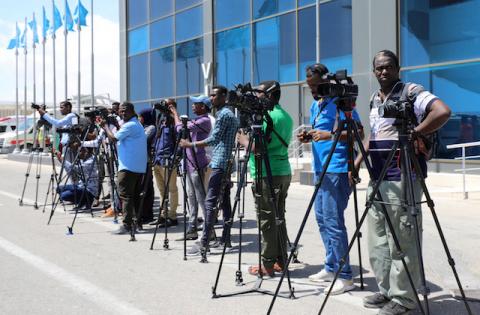Advertisement
In further bid to silence media, Somalia harassing journalists online - Amnesty
NAIROBI (Reuters) - Amnesty International has accused Somalia's government of creating teams of online monitors who troll journalists and report them to Facebook's standard enforcers in order to disable their accounts and silence critical media voices.
The Western-backed government in Mogadishu detained 38 journalists last year, setting a national annual record, the Somali Journalists Syndicate said last month, raising concerns ahead of a parliamentary election later this year.
Indeed, the efforts by government censors were paying off, with 10 Facebook accounts belonging to journalists being shut in a single day last June, the London-based watchdog said in a new report on the state of media freedom in Somalia on Thursday.
All were told by Facebook that their accounts had violated community standards, without more specific reasons.
The Somali government rejected the Amnesty report, which also detailed other instances of abuse of the freedom of the press, including beatings and the detention of journalists.
"Somalia... will continue the rule of law which includes media freedom," the ministry of information said in a statement.
Some journalists detailed how their online accounts were suspended.
"My Facebook account was frozen on 16th June 2019. My WhatsApp was frozen on 21st June 2019," Ali Aden Mumin, a prominent reporter for the local Goobjoog radio and TV, told Reuters.
Mumin, who fled to Turkey last month after receiving threats from Somali security forces, told Reuters he had been beaten and arrested by the forces several times.
Facebook declined to specify the reasons for each suspension, citing privacy concerns.
"The community standards we use to determine violations is based on global standards," said Mercy Ndegwa, head of public policy at Facebook for the East and the Horn of Africa.
Amnesty International researcher Abdullahi Hassan said some of the Facebook accounts that were targeted for closure had up to 60,000 followers, in a country where many turn to the platform to find out what is happening.
Newly set up social media-monitoring teams housed in the offices of the president, the prime minister, and the information minister had made it easier to crack down on journalists online, Amnesty said.
These teams observe content posted by reporters and ask them to remove posts critical of the government. If they refuse, they are arrested, Hassan said.
"They are arrested and… given a file full of content they have shared on Facebook. They are told you can remove this content… or we will prosecute you, or we will hang you," he said.
(Additional reporting by Abdi Sheikh and Feisal Omar in Mogadishu; Editing by Duncan Miriri and Bernadette Baum)



















Add new comment